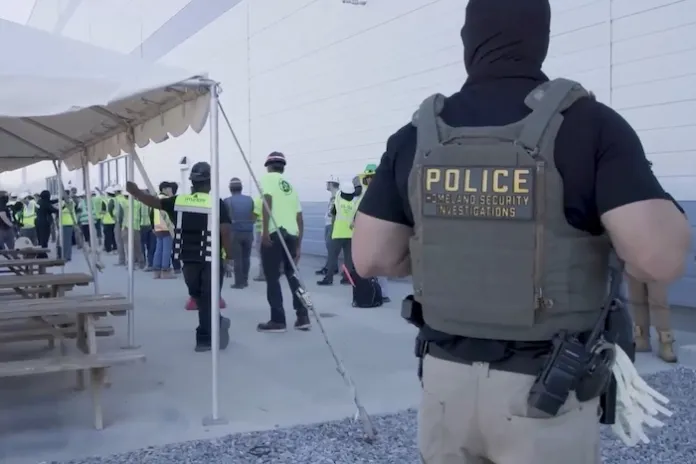Federal law enforcement at Immigration and Customs Enforcement has made worksites a major focus of its strategy, going after illegal immigrants at job sites in the hopes of rounding up large numbers of people at one time, according to two sources with firsthand knowledge.
“Worksite enforcement is the big ticket now,” said the first official, who was not authorized to speak with the media and spoke on the condition of anonymity. “They’re going to be doing a lot of those types of operations.”
Since the Trump administration commenced what it promised would be the “largest-ever” deportation operation in U.S. history in January, ICE and federal law enforcement have largely targeted criminal illegal immigrants and made collateral arrests.
A second official explained that the next step was targeting cities, like what happened in Los Angeles at the start of summer.
“The president has promised to get rid of all the criminals, and so I think in the practical sense, they needed time to get additional detention space. They focused on the worst of the worst, to understand how to do that, practice it, scale it up,” the second official said. “Then they went to the at-large operation, which was, Los Angeles being the biggest example, but that operation is happening in every big city in America right now. And it was Chicago, Boston, Florida.”
City and state law enforcement have signed what are known as 287(g) agreements with ICE, which allow nonfederal police to be deputized to work with ICE and carry out federal immigration enforcement. That led to additional arrests, all while ICE was opening additional immigrant detention sites in Florida, Indiana, Nebraska, Louisiana, and Tennessee.
Raids began in early spring with a handful to more than a dozen arrests per location, such as one in New Jersey and another in Massachusetts.
More recent raids at job sites have resulted in dozens to hundreds of arrests at a time, such as the 300 illegal immigrants from South Korea who were nabbed at a Hyundai manufacturing plant in Georgia in early September.
Focusing on job sites “always has been part of the plan,” according to the second source.
By late summer, ICE began showing up at job sites, which gives it a much bigger return on its investment. Arresting one person at large can take days or weeks of planning and requires a dozen or so federal police on site to make that apprehension.
“It’s more layers — we’re going to do this, and then we’re going to add this capability to it, and we’re going [to] add this capability,” the same official said. “We’re not abandoning what’s being done already, but we’re adding tools.”
Employers are given notice before ICE shows up on site and told to have workers’ work documents available for federal police to review. If tax records and documents do not add up, employers and employees may be arrested and detained as investigators sort out who is illegally present in the United States or illegally employing workers.
Investigators at ICE’s Homeland Security Investigations arm may spend several months scoping out large businesses it suspects of using illegal hiring practices before officers raid a job site.
Simon Hankinson, senior research fellow at the Heritage Foundation’s border security and immigration center, said the Trump administration was going far beyond previous Republican administrations, which did not want to hurt Republican big business.
“We’ve had prior Republican administrations where they want to look like they’re doing something on enforcement, but they’ve kind of been bought by the business lobby, and so they don’t actually want to raid work sites,” Hankinson said in a phone call. “You want to find large numbers of illegal immigrants? You go to where they are illegally working.”
Hankinson and the two officials also anticipated that arrests, particularly at job sites, would spike in 2026 as ICE continues to onboard its 10,000 newly hired deportation officers and expand detention space, which will allow officers to make more arrests and have the space to detain them through deportation.
TRUMP SENDS FEDERAL POLICE TO BATTLE CRIME IN MEMPHIS AT REQUEST OF TENNESSEE GOV. BILL LEE
“2026 is going to be significantly bigger than 2025. We’re going to have more people self-deport [as they] realize that [ICE is] not playing — that there is a chance that if you’re working here illegally, you will be caught,” Hankinson said. “I do see enforcement being much more, in numbers, being more impressive in 2026.”
ICE did not respond to a request for comment.

